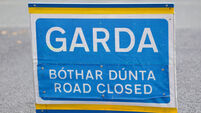Baby who died 'gasping for breath' should have had prompt blood transfusion, court told

The court heard the expert evidence makes clear the baby was born with a “very significant” loss of blood and that a blood transfusion should have taken place within a few minutes of his birth. File photo
A legal action taken by the parents of a newborn baby who died “gasping for breath” over a 13-hour period after doctors withdrew care has been opened before the High Court.
Tia Suhaila Habib (31) and Robert Coyne (39), of Derravaragh Abbey, Multyfarnham, Co. Westmeath, have sued the Health Service Executive (HSE) for damages arising from alleged medical negligence and breach of duty regarding the circumstances surrounding the birth and death of their son Jack Coyne at Midland Regional Hospital in Mullingar in September 2016.











